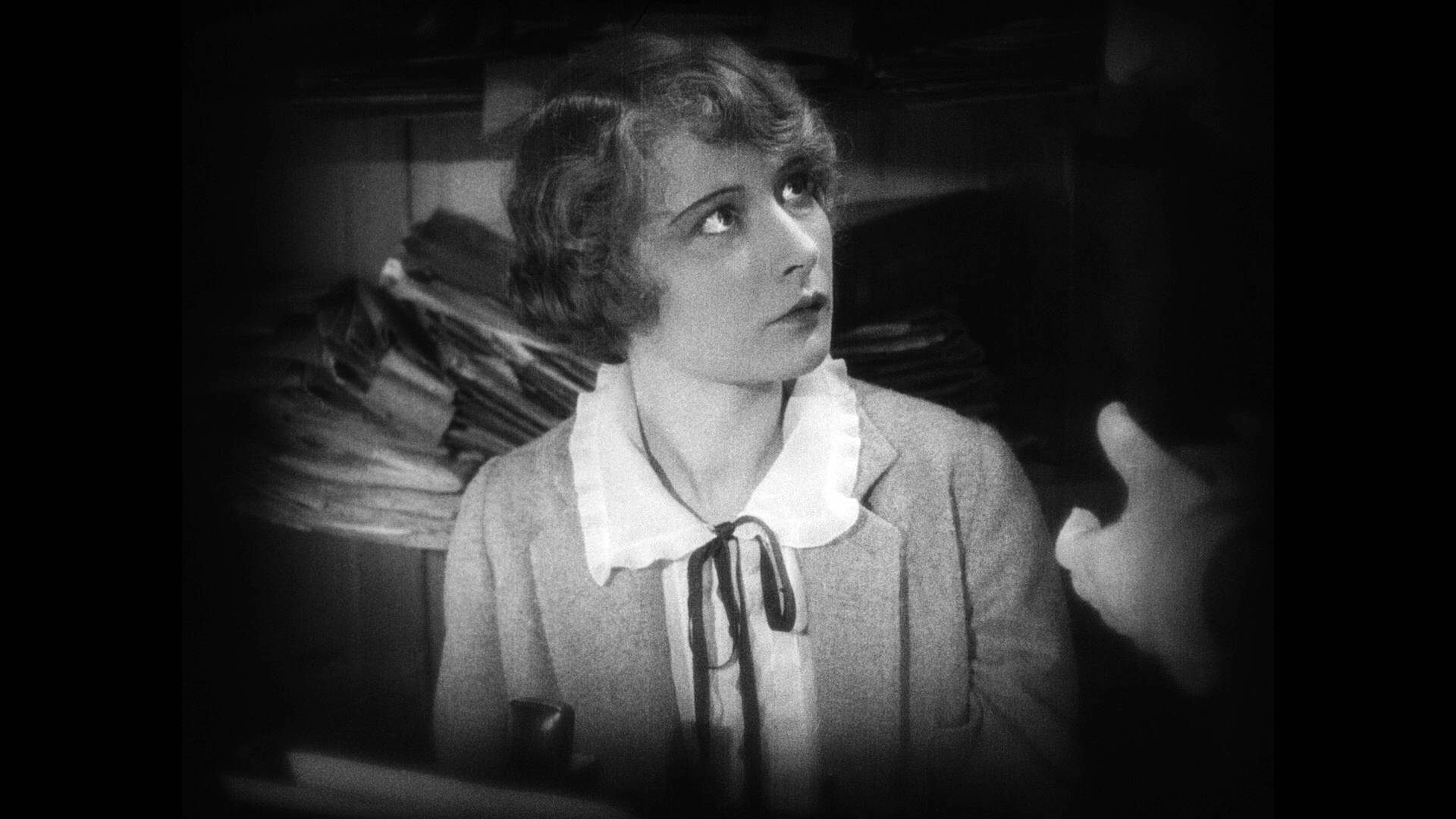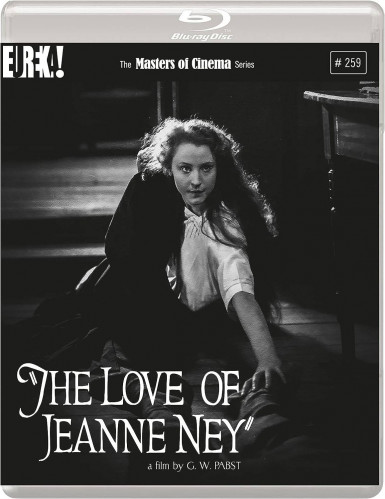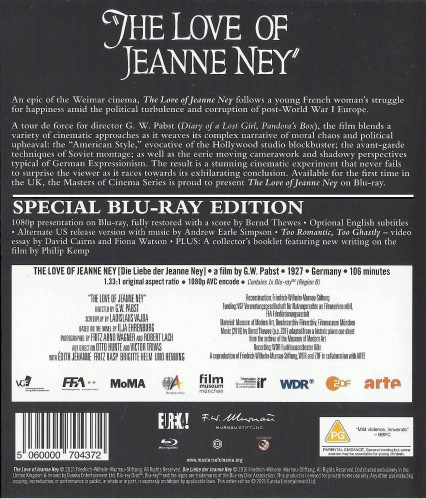THE LOVE OF JEANNE NEY [1927 / 2021] [Masters of Cinema] [Blu-ray] [UK Release]
An epic drama which spans two countries and embodies the turbulence and uncertainties of the time!
THE LOVE OF JEANNE NEY [Die Liebe der Jeanne Ney] [1927] An epic of the Weimar cinema, ‘THE LOVE OF JEANNE NEY’ follows a young French woman’s struggle for happiness amid the political turbulence and corruption of post-World War I Europe.
A tour de force for director Georg Wilhelm Pabst (‘Diary of a Lost Girl, Pandora’s Box’), the film blends a variety of cinematic approaches as it weaves its complex narrative of moral chaos and political upheaval: the “American Style,” evocative of the Hollywood studio blockbuster; the avant-garde techniques of Soviet montage; as well as the eerie moving camerawork and shadowy perspectives typical of German Expressionism. The result is a stunning cinematic experiment that never fails to surprise the viewer as it races towards its exhilarating conclusion. Available for the first time in the UK and the Masters of Cinema Series is proud to present ‘THE LOVE OF JEANNE NEY’ on EUREKA! Entertainment Blu-ray. PRESS: “an ambitious attempt to synthesize Soviet montage, Hollywood action-melodrama, and German mise-en-scène” – American Film Critic J. Hoberman
FILM FACT No.1: ‘THE LOVE OF JEANNE NEY’ was shot at the UFA film studios in Babelsberg and on location in Paris. For reasons of authenticity, Pabst had the partying White Russians in the opening sequence played by actual White Russian expatriates. Ilja Ehrenburg, initially excited about the opportunity to work with Pabst, whose films he held in esteem, was soon disappointed to find that the director was more concerned with set details than the “absurdity” (Ilja Ehrenburg) of the script. Protesting in vain against Pabst's changes to his original work (including a happy ending not in the book), he tried to have his name removed from the titles, condemning the resulting film for its philistine morals, such as having communist Andreas kneel in front of the holy virgin. After Alfred Hugenberg had acquired the producing company UFA, more changes were demanded against Pabst's will, including the almost complete deletion of the scene with Jeanne and Andreas spending the night at the hotel. ‘THE LOVE OF JEANNE NEY’ premiered in Berlin on 6 December 1927. It was released by Parufamet, a joint distribution company by UFA, Paramount Pictures and Metro-Goldwyn-Mayer. For the American release version, 20 minutes were cut from the film and, in certain scenes, different camera angles used. Because the film negatives of both the German and USA version are lost, HD restorations were made based on negative duplicates and prints. The German version was restored in 2016 from a duplicate made by the Museum of Modern Art in the 1930s, the USA version from a German archive copy. The restored German version was first screened with live music at the UFA Filmnächte in Berlin in August 2017 and premiered on Arte TV the following month. It was released on home media in Germany, the US and the UK between 2018 and 2021.
FILM FACT No.2: We are informed that two separate versions of the film THE LOVE OF JEANNE NEY’ were created for its initial release. Each was assembled from the original camera negatives, which sometimes differed greatly in terms of control and composition. Neither the original negatives have survived. The “A” negative was used from the American market, and the “B” negative was for the European distribution. In the 1930’s, a print was struck from the “B” negative on behalf of the MoMA [Museum of Modern Art] in New York, which replaced the German intertitles with English. The MoMA print, which was derived from the original “B” negative, was the primary source material for this 2K restoration. German intertitles have been re-inserted, using the original tect as preserved in censors records.
Cast: Édith Jéhanne, Uno Henning, Fritz Rasp, Brigitte Helm, Adolf E. Licho, Eugen Jensen, Hans Jaray, Sig Arno, Hertha von Walther, Vladimir Sokoloff, Jack Trevor, Mammey Terja-Basa, Josefine Dora, Heinrich Gotho, Milly Mathis, Margarete Kupfer, Robert Scholz and Victor Trivas
Director: Georg Wilhelm Pabst
Screenplay: Ilja Ehrenburg (novel), Ladislaus Vajda (screenplay) and Rudolf Leonhardt (screenplay)
Composer: Bernd Thewes and Hans May
Music Department: Frank Strobel (conductor) and Wdr Funkhausorchester (orchestra)
Cinematography: Fritz Arno Wagner (Director of Photography) and Robert Lach (Director of Photography)
Image Resolution: 1080p (Black-and-White)
Aspect Ratio: 1.33:1
Audio: 2.0 LPCM Stereo Audio
Subtitles: English
Running Time: German: 106 minutes and American: 86 minutes
Region: Region B/2
Number of discs: 1
Studio: UFA GmbH / MoMA / WDR / 2DF / ARTE / EUREKA! Entertainment
Andrew’s Blu-ray Review: ‘THE LOVE OF JEANNE NEY’ [Die Liebe der Jeanne Ney] [1927] Jeanne Ney [Édith Jéhanne] is the daughter of a political observer killed in an altercation with her lover Andreas Labov [Uno Henning), Jeanne Ney flees to Paris to be with her Uncle Raymond (Adolf E Licho] and blind cousin Gabrielle (Brigitte Helm), unaware that she is been followed by both Andreas Labov and the duplicitous Khalibiev [Fritz Rasp] whose selfish ambition precipitated the killing, having furnished a list of agents which would have placed the Andreas Labov and his associates in peril.
Scenes in ‘THE LOVE OF JEANNE NEY’ flow as smoothly as do the silent dramas as Josef von Sternberg. The suspenseful romantic melodrama Jeanne Ney makes no particular claim to great art or importance. Its source is a pot-boiler novel by Soviet revolutionary Illya Ehrenburg, whose life experiences brought him into contact with top historical and artistic names in Bolshevist Russia and the art haunts of Paris. Ehrenburg reportedly repudiated Pabst's movie, for dropping all of his political rhetoric.
‘THE LOVE OF JEANNE NEY’ is a marvellous personality by the name of Édith Jéhanne, and we are told died just a couple of years later, about the time that talking pictures were coming in. The movie is in some ways artistically chaotic, in that it mixes more than one acting style and even bounces between genres – political conspiracy thriller, documentary-like street scenes, intimate romantic melodrama. Rich characters drift in and out of the narrative. The story plays well and comes to a satisfying conclusion, even if a score of subplots are just left unresolved!
In the Crimea during the Civil War, neutral French businessman Andre Ney [Eugen Jensen] is doing spy work for the White Russians. His beautiful daughter Jeanne Ney [Édith Jéhanne] falls in love with Andreas Labov [Uno Henning], a handsome Russian. Unbeknownst to her, Andreas is a Bolshevik spy. The unscrupulous apolitical scoundrel Khalibiev needs money, and so sells a fake list of Red agents to Andre. Jeanne and Andrea find out each other's true identities only after an unfortunate shooting. The Red Russians overrun the city. Helping Jeanne Ney return to Paris is a ranking Party officer who takes a fancy to her.
In Paris, Jeanne is taken in by her Uncle Raymond (Adolf Licho), the proprietor of a shady detective agency. Her cousin Gabrielle (Brigitte Helm) is blind, and easily spooked. Raymond Ney's main operative Gaston cleverly recovers the lost diamond of a White Russian expatriate, for which the greedy Uncle Ray anticipates a 50,000 franc reward. Andreas arrives in Paris, to deliver money to fund a Communist labour campaign in Toulon. But the penniless Khalibiev also comes to town, posing as a wealthy White Russian and soon launches a series of outrageous crimes against the Neys, including a murder he wants to pin on his arch-rival, Andreas.
‘THE LOVE OF JEANNE NEY’ starts slowly but soon picks up speed. The Crimea section is all about smoky dens of White Russian revelers with their wild drinking and loose women. The handsome Andreas and Jeanne are seen in flashback cavorting in the countryside, and in the present trying to meet in a staggering downpour. The audience is at all times ahead of the characters. Jeanne doesn't realize that Khalibiev is responsible for her father's death, or that he is fooling Uncle Raymond by offering to marry his 'defective' daughter Gabrielle. Khalibiev assaults Jeanne, and then pre-empts her protests by convincing Raymond that she came on to him. Then he steals what he needs from Jeanne's purse to frame Andreas for the murder he's about to commit.
Édith Jéhanne and Uno Henning's performances are as naturalistic, without a bit of romantic overstatement. On the other hand, Brigitte Helm is caught up in expressionist histrionics, with a constant look of hypnotized anguish on her face. Uncle Raymond lives in his own expressionist mind storm of greed. Late at night, he obsesses over the recovered diamond, swooning in orgasmic delight as he counts invisible money.
‘THE LOVE OF JEANNE NEY’ plays extremely well as beautifully-conceived scenes, which in this case is more than enough – the story seems at all times alive and “happening.” We have to surmise that a lot of the original narrative was thrown out, either to jettison the Communist sub-plot or simply because Pabst simply wanted to focus on the romantic couple. Zachariewicz and Andre's former servant [Mammey Terja-Basa] enter as important characters but are never seen again. The final showdown between Jeanne and Khalibiev is really powerful. The “closure” for Jeanne is warmly poetic, but everybody else's problems are left in flux. What will happen to Gabrielle, Poitras, Gaston? Did G.W. Pabst cut down a longer continuity, or did he just throw out plot complications that didn't interest him?
There's enough potential story incident here, with so many interesting characters to develop, that Jeanne Ney could easily be expanded to a multi-hour miniseries. But how to find actors as ideal as those seen in this movie?
* * * * *
Blu-ray Image Quality – UFA GmbH, MoMA, WDR, 2DF, ARTE and EUREKA! Entertainment presents us the film ‘THE LOVE OF JEANNE NEY’ [Die Liebe der Jeanne Ney] with a wonderful 1080p 2K image presentation and is viewed with a 1.33:1 aspect ratio. The Blu-ray really looks good in high-definition, especially when cinematographers Fritz Arno Wagner and Robert Lach pulls out all the stops and makes the Black-and-White image presentation is total perfection. So all in all, I really recommend this EUREKA! Entertainment Blu-ray release. Please Note: Playback Region B/2: This will not play on most Blu-ray players sold in North America, Central America, South America, Japan, North Korea, South Korea, Taiwan, Hong Kong and Southeast Asia. Learn more about Blu-ray region specifications.
Blu-ray Audio Quality – UFA GmbH, MoMA, WDR, 2DF, ARTE and EUREKA! Entertainment brings us the film with a 2.0 LPCM Stereo Audio is totally awesome and clear and you can hear all of the instruments in the orchestra with total clarity and on top of all the, the inspired composed music by Bernd Thewes and Hans May really adds to the atmospheric ambience of the film and matches all the scenes in this German silent film. With the American version it is only accompanied by a single player, who is Andrew Earle Simpson and plays the piano really superb ad you can hear all the notes from the piano really outstanding.
* * * * *
Blu-ray Special Features and Extras:
Special Feature: 1080p presentation on Blu-ray and fully restored with a film score composed by Bernd Thewes and Hans May
Special Feature: Alternate USA film release version with a film score composed by Andrew Earle Simpson [1927] [108] [1.33:1] [86:00]
Special Feature: Too Romantic, Too Ghastly – Brand New video essay by David Cairns and Fiona Watson [Audio only] [2015] [108p] [1.33:1 / 1.78:1] [25:22] With this featurette, we get to hear an audio/video in-depth essay by David Cairns and Fiona Watson about the film ‘THE LOVE OF JEANNE NEY,’ but they also talk in depth about the director Georg Wilhelm Pabst [1885 – 1967] and they say that he was considered by many to be the greatest director of German cinema, in his era. Georg Wilhelm Pabst was especially appreciated by actors and actresses for the humane way in which he treated them. This was in contrast to some of his contemporaries, such as Arnold Fanck, who have been characterized as martinets. They also talk about his best known films he had directed, such as ‘The Joyless Street’ (1925) with Greta Garbo and Asta Nielsen, ‘Secrets of a Soul’ (1926) with Lili Damita, ‘The Loves of Jeanne Ney’ (1927) with Brigitte Helm, and ‘Pandora's Box’ (1929) and ‘Diary of a Lost Girl’ (1929) with American actress Louise Brooks. Georg Wilhelm Pabst also co-directed with Arnold Fanck a mountain film entitled ‘The White Hell of Pitz Palu’ (1929) starring Leni Riefenstahl. After the coming of sound, he made a trilogy of films that secured his reputation: ‘Westfront 1918’ (1930), ‘The Threepenny Opera’ (1931) with Lotte Lenya (based on the Bertolt Brecht and Kurt Weill musical), and Kameradschaft (1931). Georg Wilhelm Pabst also filmed three versions of Pierre Benoit's novel ‘L'Atlantide in 1932,’ in German, English, and French, titled ‘Die Herrin von Atlantis,’ ‘The Mistress of Atlantis,’ and ‘L'Atlantide,’ respectively. In 1933, Georg Wilhelm Pabst also directed ‘Don Quixote,’ once again in German, English, and French versions. After making ‘A Modern Hero’ (1934) in the USA and ‘Street of Shadows’ (1937) in France, Georg Wilhelm Pabst (who was planning to emigrate to the United States) was caught in France in 1939, when war was declared, whilst visiting his mother, and was forced to return to Nazi Germany. Under the auspices of propaganda minister, Josef Goebbels, Georg Wilhelm Pabst made two films in Germany during this period: ‘The Comedians’ (1941) and ‘Paracelsus’ (1943). Georg Wilhelm Pabst directed four opera productions in Italy in 1953: “La forza del destino” for the Maggio Musicale Fiorentino in Florence (conducted by Dimitri Mitropoulos, the cast included Renata Tebaldi, Fedora Barbieri, Mario del Monaco, Aldo Protti, Cesare Siepi), and a few weeks later, for the Arena di Verona Festival, a spectacular “Aïda,” with Maria Callas in the title role (conducted by Tullio Serafin, with del Monaco), “Il trovatore” and again “La forza del destino.” Georg Wilhelm Pabst directed ‘The Last Ten Days’ (1955), the first post-war German feature film to feature Adolf Hitler as a character.
PLUS: A collector’s 28 page booklet featuring new writing entitled “EUROPE IN FILL DISITEGRATION” Pabst and Jeanne Ney by Philip Kemp. We are informed that Philip Kemp is a freelance reviewer, film historian, and regular contributor to the publication Sight & Sound and Total Film. Philip Kemp also teaches film journalism at the University of Leicester in England.
Finally, ‘THE LOVE OF JEANNE NEY’ [1927] is an epic drama which spans two countries and embodies the turbulence and uncertainties of the time. Playing with a number of cinematic styles, director Georg Wilhelm Pabst creates a work which consistently defies expectations and creates some really fascinating sequences. What makes it stand out from most of its peers is the number of different elements at play within ‘THE LOVE OF JEANNE NEY’ and is a film which works on many levels. The original negatives having been lost, the two versions presented are reconstructions from secondary sources, the prints sometimes marked but the imperfections forgivable after almost a century of wear, the 106 minute original cut having had the original German language intertitles recreated alongside the sometimes substantially different 86 minute edit released in America. Recommended!
Andrew C. Miller – Your Ultimate No.1 Film Aficionado
Le Cinema Paradiso
United Kingdom



